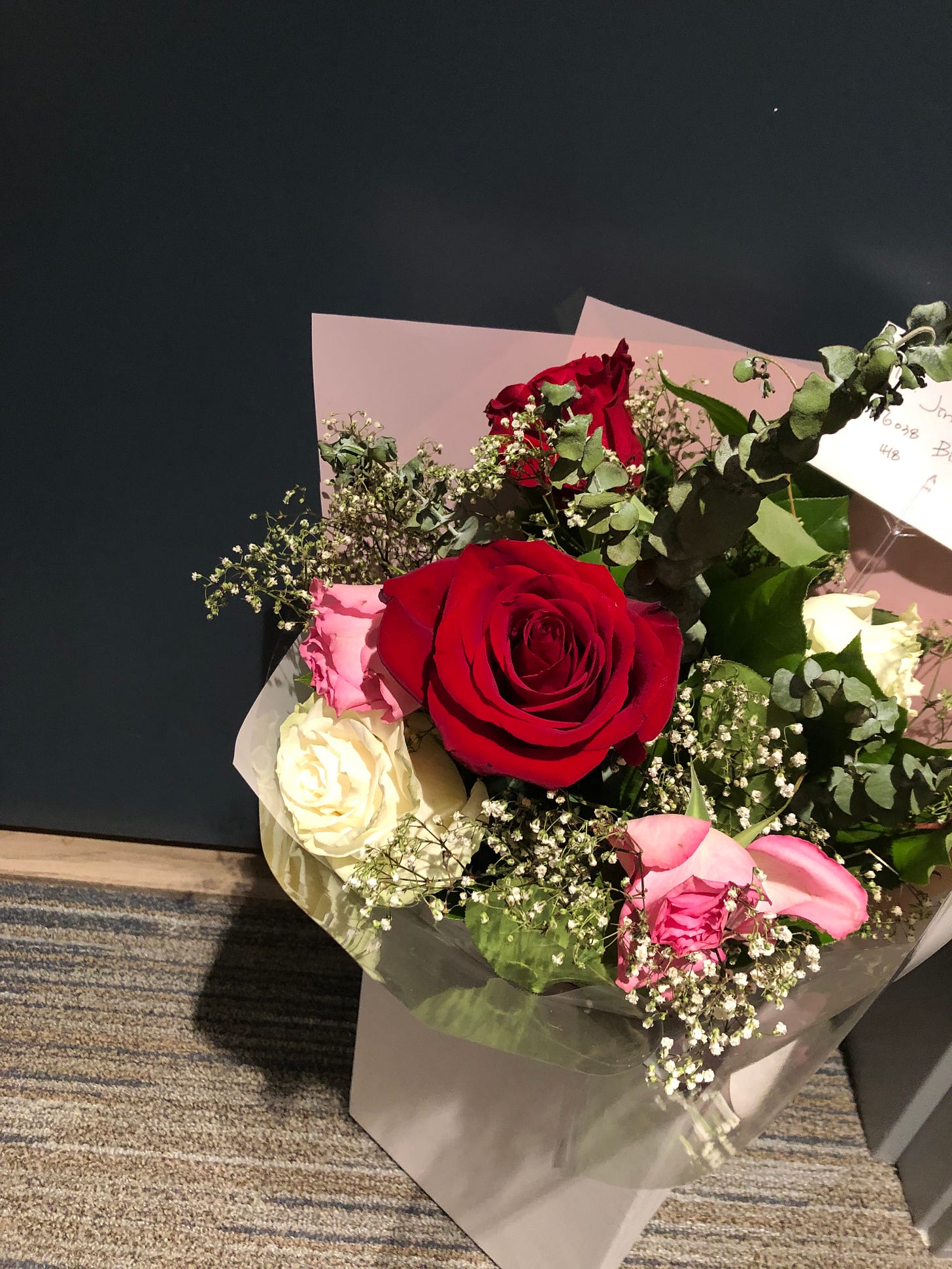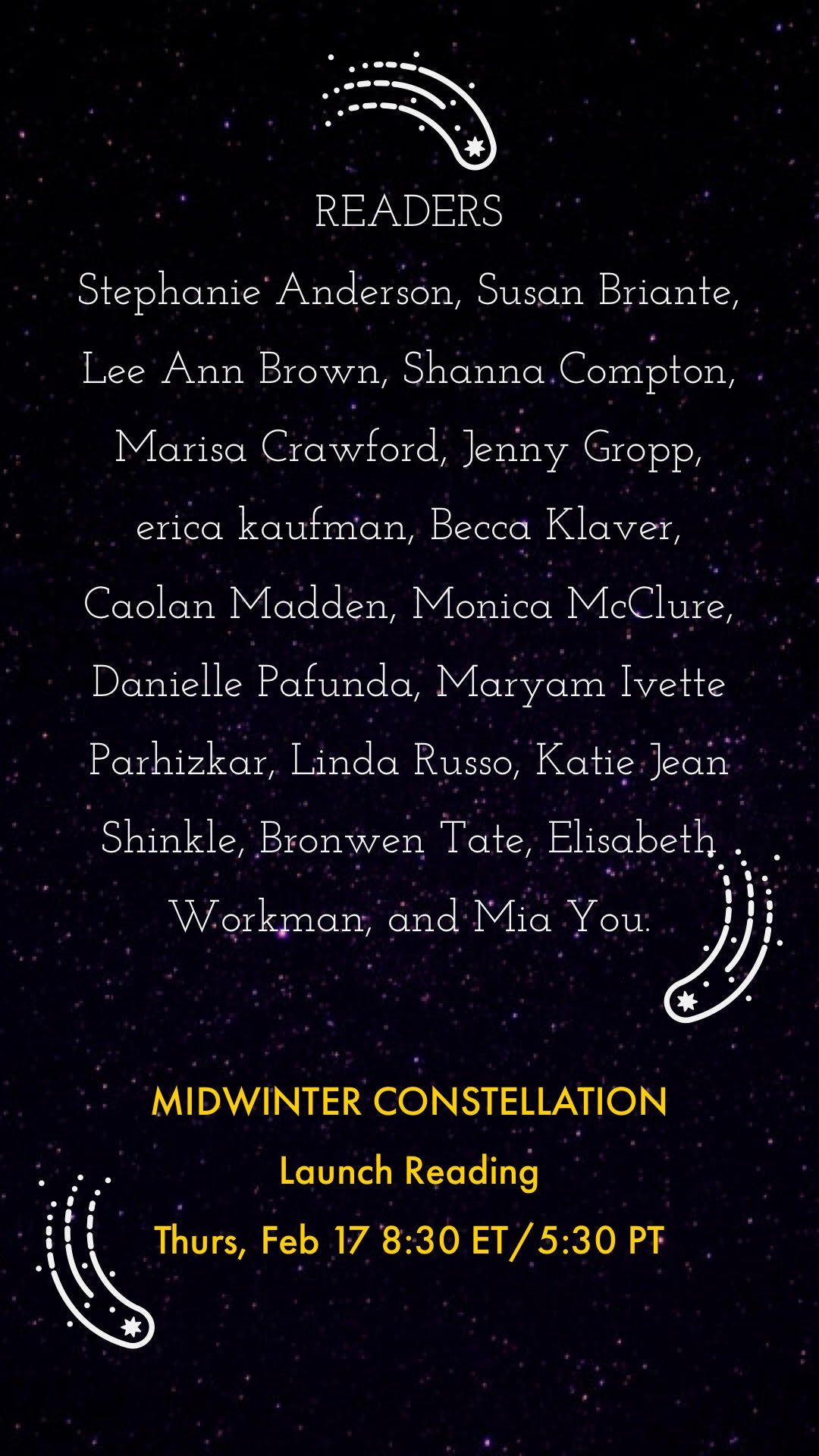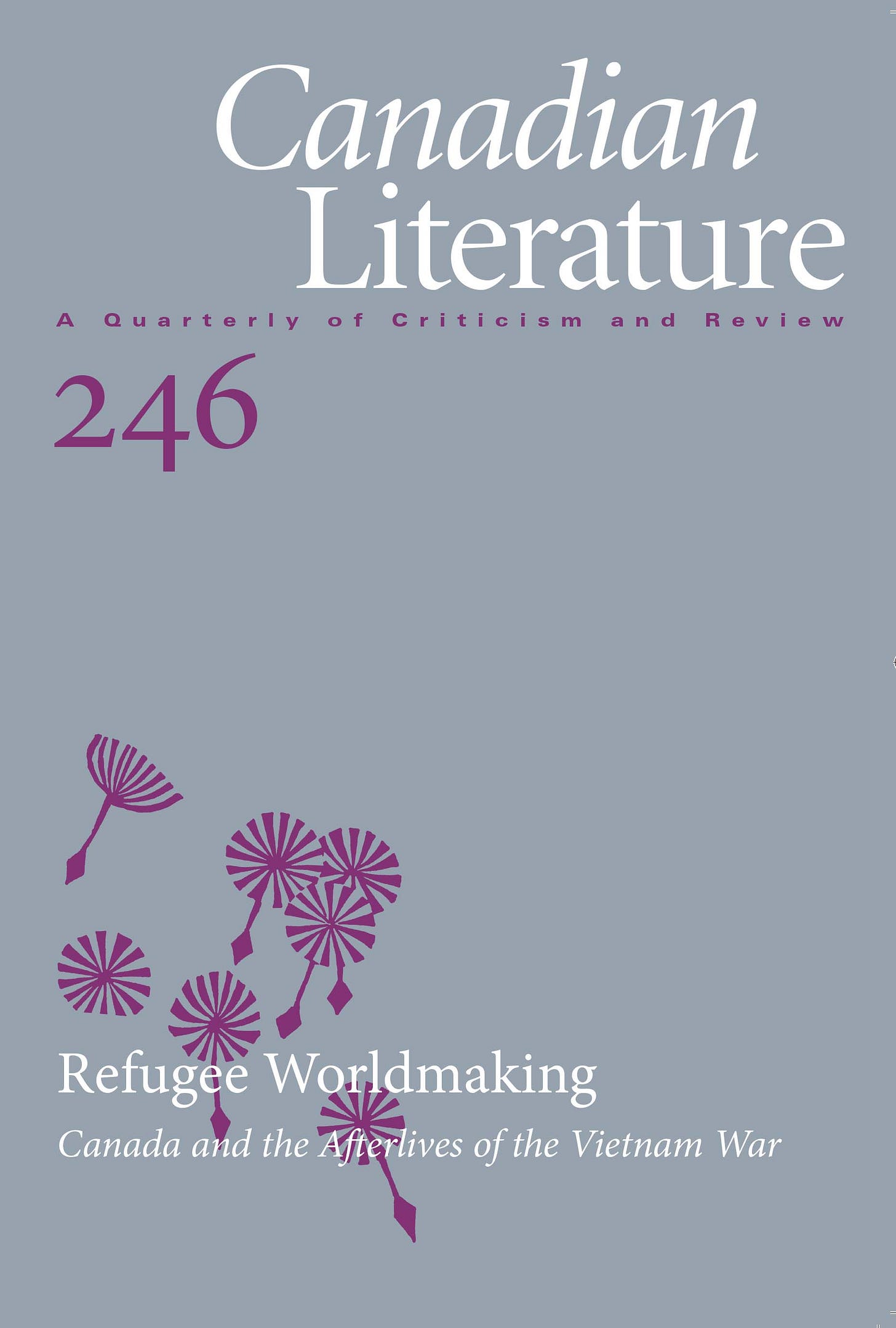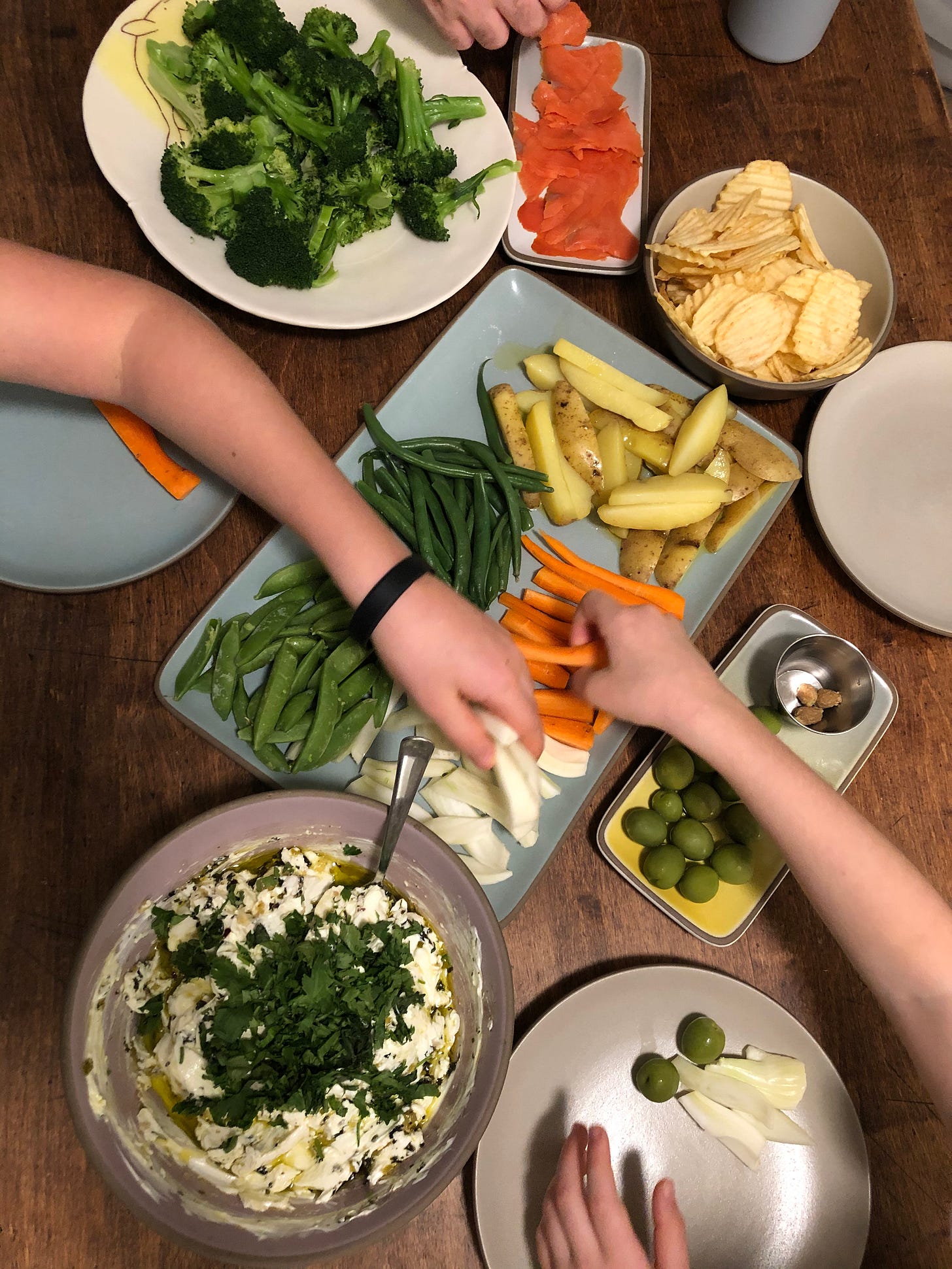I Have Lost to February
February Blues, Being a Beginner, Finding (or Making?) Your Voice, Craig Morgan Teicher, Johannes Göransson, Midwinter Constellation Reading Tonight!, Harp & Altar, Canadian Literature, Snack Dinner
Hello Friends,
It’s February, and down the hall from my apartment, a Valentine’s Day bouquet sits unclaimed in front of a closed door. I’ve thought about taking it home to put in water and leaving a note for the (presumably out-of-town) recipient. But instead, I’ve started taking pictures of its changing state like it’s some kind of site-specific sculpture or installation piece as I pass by to check the mail or pick up the kids. "I feel you, languishing bouquet,” I mutter. It’s February and we’re tired, blooming and wilting more alone than not it feels most days.1
2022 began for me with a rush to prepare a big new course and a notification that my children's school would be delayed by a week, followed shortly by a Covid diagnosis for my son. He made it through just fine, and the rest of us remained isolated and either got very mild cases or dodged it (limited test availability, so we don’t know!), but it’s been a rocky start to the year.
The big new course I’m teaching is “Introduction to Writing Poetry,” and it is stretching me in all kinds of ways. First off, it’s truly big! It’s a lecture-based course for 175 students (yes, larger than the entire student body of my last job).2 It’s also a blended course, meaning that half of the material consists of short videos, readings, and writing assignments that students complete asynchronously. Scripting and recording tight short videos: also new for me. And we started the term online and then switched to in-person just last week, so I’ve been learning how to deliver interactive lectures to large groups both on Zoom and in a big lecture hall.3 On a deeper level, I’ve been pushed to identify what I think students need to know as they begin writing poetry. And I’ve been pushed to figure out how to demystify the workings of poems without false universalizing. It’s exciting and wonderful and some days it makes my head hurt.4
I’ve also recently started taking guitar lessons at the community center up the street. I didn’t exactly set out to synchronize teaching an introductory class and feeling like a raw beginner, but I have to say that I’d recommend it. It’s hard to be a beginner! My fingers hurt, and calluses are only slowly developing. I’m slow as heck at changing chords. I get tripped up in the same part of the scale over and over again. I try to play along with a Gillian Welch song, and I just can’t hear where she’s changing chords. It’s a good reminder of how many skills (of ear and hand and mind) playing a song or writing a poem draws on and of how slow and effortful it can be to grow those skills. Productively humbling.
Ok, But How?
When I asked earlier if anyone had process questions they were grappling with, my former student Jade write with this query:
These days, I'm struggling most with just putting words out on the page. I have so many drafts I could drown in them, but most only consist of 2-3 lines max. I see so many wonderful writers online finishing poems within a day and I'm definitely thinking "ok, but how??" I think I'm also puzzling over my poetic voice. While I've got a fairly good grasp on my fiction/prose voice, I am always feeling like my poetic voice could be better or my style could be more like [some other writer I admire]. It sounds weird to say but my poems often don't feel "poem-y" enough to me, even though logically, I know that poems come in all kinds of forms and styles!
Dear Jade (and anyone else who has wondered about these big questions), I’d like to respond to a few things here.
Two Small Reassurances
First off, what we see “wonderful writers doing online” is often such an incomplete picture of what’s happening. What we see online and what’s actually going on can be so far apart. If it helps, though, think of poets like Elizabeth Bishop, or Lucie Brock-Broido, or Lorine Niedecker who “took a lifetime / to weep / a deep / trickle.” Or think about Diana Khoi Nguyen who visited my class last term and told us that she has two short periods of deep all-in writing each year and the rest of the time is just gathering, researching, and letting things accumulate.
Having many drafts with fragments of 2-3 lines is an amazing place to be as a poet. So many wonderful poems work through juxtaposition and leaping. Why not try out this mode with the wealth of material that you have? You might put all of your bits and pieces in a big document or even print them out and cut them into pieces and start shuffling them. When you put two fragments next to each other, can you feel a spark leap between them? Or can you imagine an image or a statement that might bridge the gap between them? Letting go of lineation to work in a prose poem format offers one path for exploring this kind of sustaining and leaping. Or you might pick a shape—four quatrains or five couplets, say, and start fitting your material into this shape as if you were putting together a puzzle. You only need to figure out where the next piece might go. And then the next piece after that might become clear.
Puzzling Over Voice
The voice question is one I’d like to dig into a bit more deeply. First off, it’s hard to remember what we know! Just because we know something on one level doesn’t mean it has truly permeated all the way to the core. Next, just this morning poet and essayist Anne Boyer shared this bit from an Adriene Rich essay called “To Invent What We Desire”:
“That to mis-take, to mis-prize, your own life and its landscapes, to imagine that poetry belong by right to others (of another culture, gender, class, century) and not to you, means falling—if not into silence—into language others found in struggle with their own conditions. Then you become a mouthpiece for the lives of others, you inhabit their rhythms, their vocabularies, you lose track of your own desire in an adopted style.”
The essay is written with marginal annotations, and the annotation for this section reads:
“We must use what we have to invent what we desire.”
So that’s a starting point. If your voice doesn’t feel “poem-y” enough, or if you feel like your style should be more like that of some other writer, I think it’s worth pausing and asking if there’s some part of you that feels that poetry “belongs by right to others.” And then gently tell that part that it’s wrong. And repeat that over and over. For the course of a lifetime, really.
But here’s the thing. I would also push back hard against the idea that you (or I or any of us) have a single authentic voice to discover or that working in “an adopted style” is necessarily a bad thing.
I thought about this paradox a lot a couple of years ago when I read Craig Morgan Teicher’s We Begin in Gladness: How Poets Progress and Johannes Göransson’s Transgressive Circulation: Essays on Translation within a few weeks of each other. Looking back now to the Commonplace Book I was keeping at the time, I’m remembering how Teicher tracks a gradual finding and refining of voice across the work of poets like Sylvia Plath and Lucille Clifton, while Görunsson questions the nationalist impulse that makes people wary of translation and shows how this impulse can manifest as a rather fetishistic and essentializing call to “find your voice.”
Here’s Teicher on learning to hear what he calls “the voice of the mind”:
“Though it seems, at first an art of speaking, poetry is an art of listening. The poet trains to hear clearly and, as much as possible, without interruption, the voice of the mind, the voice that gathers, packs with meaning, and unpacks the language the poet knows. It can take a long time to learn to let this voice speak without getting in its way” (5).
And here’s Görunsson on what can lurk behind “find your voice.”:
“Behind the phrase ‘write what you know’ is a profoundly regionalist model urging writers not to stray into the strange world beyond their home, not to subject themselves to ‘foreign influences’ . . . another key component of this motto is that you ‘find’ your voice: it is natural, it comes from within, it is not artifice and it is not foreign” (21).
I think there’s insight in both perspectives, Jade. And I think it’s usefully difficult to hold them together. Voice, like emotion, is both experienced and performed. Both found and made. Discovered and chosen.
Elsewhere & Upcoming
Reading! Tonight!
I’m reading this afternoon/evening (depending on where you are) with a truly stellar crew as part of the Zoom launch of Midwinter Constellation.
Midwinter Constellation Virtual Launch
Thursday, February 17, 2022 // 8:30 ET – 7:30 CT – 6:30 MT – 5:30 PT
Register for the Zoom meeting here.
Join the authors of Midwinter Constellation as they read excerpts from their collaboratively written book, just published by Black Lawrence Press! Attendees will be given a promo code for 30% off Midwinter Constellation and any other Black Lawrence Press title through the end of February.
To learn more about Midwinter Constellation, check out these essays by some of the authors at Post45, this review in Little Village, and the book’s page on the Black Lawrence Press site.
New Poems in Harp & Altar
This poem and two others from the same series are in the new issue of the recently-revived online journal Harp & Altar. The whole issue is great—poems from Prageeta Sharma, prose from Claire Donato, Amish Trivedi’s review of Cynthia Arrieu-King’s The Betweens, etc.
A Little Essay on Hoa Nguyen’s A Thousand Times You Lose Your Treasure
I had the honor of contributing a little essay as part of a feature on Hoa Nguyen’s work in the latest issue of Canadian Literature edited by Y-Dang Troeung on Refugee Worldmaking: Canada and the Afterlives of the Vietnam War. I’m so delighted to have this gathering of writing on Hoa’s work to share next time I teach her books!
I’d started to ask myself if I should really include food things in my supposedly writing-process-related newsletter, but then my dear former student Anna wrote and said, “I made the browned-butter-toasted-pecan-salted-chocolate chip cookies you mentioned in your newsletter, and they were hands down the best homemade cookie I've ever had. I made like five batches in four weeks.” So the recipes stay, friends! :)
Snack Dinner!
Less a recipe per se, more a suggestion…
Maybe you are tired of winter stews and soups and longing for tender spring produce that just isn’t here yet. Maybe you’re tired of cooking period. Again? Didn’t I just do this yesterday? In any case, may I recommend a version of snack dinner I’ve recently found extremely satisfying? It looks like this.
Any item below is optional. Use what you have / what looks good to you.
Steam a whole bunch of broccoli for 4 minutes and toss with olive oil and salt (a bit of squeezed lemon too if you like). You might also steam some green beans or some potatoes (if you, like me, feel that a meal with two different forms of potato is just enough of a good thing).
Chop up or assemble various crunchy vegetables. Here we have carrots, snap peas, and fennel. And a bit of radicchio.
Put some olives on a plate. I love Castelveltranos because they are buttery and delicious and remind me of a street market in Trieste.
Put some smoked fish on a plate if you’ve got some. We had some smoked salmon around.
Pour some potato chips into a bowl. We like the Western Family Kettle-Style Chips from Save-on-Foods when we can find them, which is not always. Ruffles will do.
Make a creamy dip. My go-to recipe these days is from Alison Roman’s Nothing Fancy and here’s the rough and speedy version: Combine about 2 cups labneh (or whole milk greek yogurt or sour cream or some combo) with salt, pepper, and enough squeezed lemon to taste it (a few tablespoons?). In a small pot, heat up 1/3 cup of olive oil and add the finely sliced white and pale green parts of 5 scallions, several tablespoons of chopped cilantro, and anywhere from 1/4 to 1 tsp. of crushed red pepper flakes, depending on how much spice you prefer. When the scallions are sizzling and fully softened, turn off the heat. Let the oil mix cool a bit, then swirl it into the labneh mix. Top with flaky salt and more raw chopped cilantro (or chives or parsley or whatever tender herb you have around).
Fennel + this dip = amazingly good (if you like fennel).
A potato chip + dip + a piece of smoked salmon = dreamy.
You and anyone with you can find your own balance steamed and raw vegetables, olives, chips, dip, etc.
And that, my dear friends, is all for today. Maybe next time I’ll write more about Commonplace Books and what my friend Amer keeps teaching me about ritual and imperfection, or about how Vesper drew the same witch face over and over, or about this newsletter was easy to write once I actually sat down and started writing it. As ever, I’d love to hear if something here resonates with you, or if there’s a process question or struggle you’re grappling with.
Yours,
Bronwen
If you want to wallow a bit in peak February feelings, allow me to recommend Dar Williams’ perfectly melancholy song:
I have three lovely TAs to help me with marking assignments and supporting students. And I’m still trying to learn as many of the students’ names as I possibly can.
I (cleverly I thought) went to visit the lecture hall before classes started to make sure I knew how to turn work the projector, the lapel mic, etc. This proved useful, but also managed to give my brain just enough detailed information to construct a really vivid anxiety nightmare. Thanks, brain.
I have lots of thoughts about what it means to teach creative writing via lecture when so much of my pedagogy thus far has relied on small workshops, but I’ll save those for a later date.









